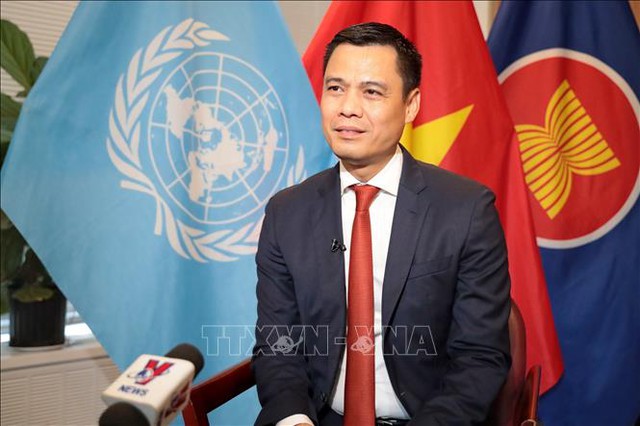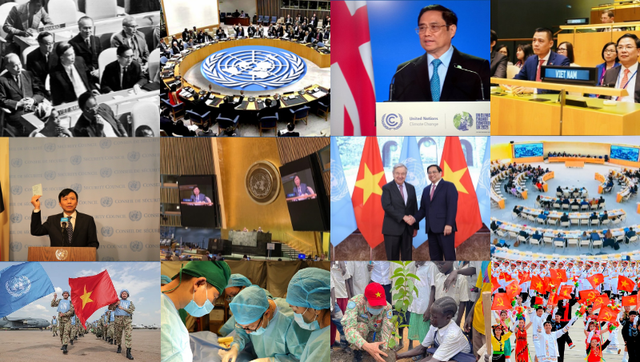Viet Nam, UN join hands to shape better furture for humanity
VGP - Over the past 47 years, the Viet Nam-UN partnership has contributed to the implementation of the common goals of the UN, for peace, stability and sustainable development of mankind, and for a better future for all, said Ambassador Dang Hoang Giang, Permanent Representative of Viet Nam to the UN.

Ambassador Dang Hoang Giang, Permanent Representative of Viet Nam to the UN - Photo; VNA
The Ambassador made the above remarks at an interview prior to General Secretary and President To Lam's tour to the U.S. to attend the United Nations Summit of the Future and the 79th session of the UN General Assembly (UNGA 79).
Dang highlighted the significance of the UNGA 79, which takes place when both the UN and Viet Nam are looking towards their 80th founding anniversaries. This milestone presents an opportunity to envision a new future and development path for both the UN and the world.
This is the first time the Vietnamese Party General Secretary attends the UNGA and also the first multilateral diplomatic activity by General Secretary and President To Lam at the global organization.
His participation reaffirms Viet Nam's foreign policy of independence, self-reliance, multilateralization and diversification of external ties, and active and proactive global integration.
It demonstrates Viet Nam's commitment to sharing its vision and solutions on the role of the UN and major global issues, while also reflecting the Party and State's profound interest in multilateral cooperation, major UN agendas, and comprehensive relations with the UN.

Bold imprints in Viet Nam-UN partnership
From a recipient country, Viet Nam has gradually become a reliable and effective partner, ranking the 49th largest contributor to the UN budget and increasingly participating in all three main pillars: peace and security, development cooperation, and human rights.
In the field of peace and security, Viet Nam is one of the leading countries supporting multilateralism and a multilateral approach to addressing global challenges and affirming the crucial role of the UN.
Viet Nam has participated in nearly all the major international treaties on the non-proliferation of weapons of mass destruction and disarmament, seriously fulfilled its obligations and promoted the implementation of these treaties, including the Treaty on the Non-Proliferation of Nuclear Weapons (NPT), and the Southeast Asia Nuclear Weapon-Free Zone Treaty (SEANFWZ). It is the 10th country in the world to ratify the Treaty on the Prohibition of Nuclear Weapons (TPNW).
Since 2014, Viet Nam has actively participated in UN peacekeeping operations, reflected through the deployment of over 800 military and police officers and soldiers to remote areas such as South Sudan, the Central African Republic, and Abyei, and the UN headquarters.
Viet nam has been elected twice by UN member states as a non-permanent member of the UN Security Council (UNSC) in 2008-2009 and 2020-2021.
Viet Nam took the lead in drafting and promoting Resolution 2573 - the first standalone resolution of the UNSC on protecting essential infrastructure, such as hospitals, schools, and water and electricity systems, for civilians in conflicts, which was co-sponsored by all 15 UNSC members and many UN member states.
Viet Nam stands out in achieving global development goals, earning high praise from the international community and encouragement to share its experiences. In the 2000-2015 period, Viet Nam successfully achieved most of the Millennium Development Goals, particularly completing the goal of eradicating extreme poverty ahead of schedule and achieving positive results in education and access to clean water and sanitation.
Viet Nam has also responded to climate change, committed to striving to achieve net-zero emissions by 2050 and strongly developing renewable energy sources for electricity production.
Viet Nam proposed an initiative to designate December 27 as the International Day of Epidemic Preparedness, aiming to raise public awareness of and preparedness against epidemics, which received support and co-sponsorship from many member states.
Regarding human rights, Viet Nam has been consistent with the Party and State's policy of taking the people as "the centre, goal, subject, and driving force of national development.
Viet Nam has been elected by the international community as a member of the UN Commission on Human Rights, the predecessor of the Human Rights Council, for the 2001-2003 term and the Human Rights Council for the 2014-2016 and the 2023-2025 terms, and the Executive Board of the UN Entity for Gender Equality and the Empowerment of Women (UN Women) for the 2025-2027 tenure.
Viet Nam promoted the initiative to recognise June 11 as the International Play Day.
Looking forward to future cooperation
In the coming time, Viet Nam will continue to strengthen its partnership with the UN to promote multilateralism, respect international law and the UN Charter.
Viet Nam will spare no effort to make practical contributions to maintaining regional and international peace and stability; respond promptly and effectively to global challenges, especially commitments relating to climate change.
In addition, the Southeast Asian nation will actively implement the national action plan to realize the 2030 Agenda; step up participation in UN peacekeeping operations; strengthen relations between the UN and regional organisations, especially promoting ASEAN's central role in the regional security architecture.
Viet Nam will also continue to mobilize support for its candidacy in important UN mechanisms including the UN Human Rights Council for the 2026-2028 tenure, the International Tribunal for the Law of the Sea (ITLOS) for the 2026-2035 tenure, and the UN Security Council for the 2032-2033 period./.
